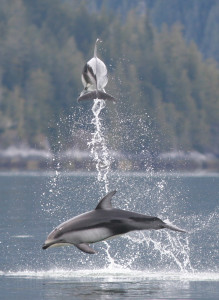Today, 22 April 2017, marks the 48th time that people around the world celebrate Earth Day. Since 1970, the effects of climate change have become undeniable, but the environmental news is not all bad. The voices of 1970s environmental grassroots movement were heard, and that public pressure led the USA to pass some of the most powerful legislation anywhere to protect endangered species and their habitat. Given our focus, it’s not surprising that we see the Marine Mammal Protection Act as one of the best examples of grassroots movements leading to real-world conservation gains. Over the last few decades, consumer demand has shifted fisheries practices to the extent that “dolphin-safe tuna” is now the industry standard in North America and Europe. Similar efforts drove the Save the Whales movement, which led to a moratorium on commercial whaling in 1986. We’re not naive, but we are inspired by #OceanOptimism.
After every public lecture we give, people ask how they can help.
People often share feelings of hopelessness and powerlessness in the face of global losses of biodiversity and wilderness. The paradox is that collectively, we hold the power to influence policy, and with every purchase we make, we have the power to influence markets and industrial practices. We cast a vote every time we buy – or choose not to buy – a product. And we are struck by the energy in today’s March For Science events around the world. The people have spoken, and they want policy to be based on reliable evidence. Our tagline, Science for the Sea, tells you that we share that view.
Here are some examples of the power of consumer choice that have inspired us lately. This is not an exhaustive list, and it draws heavily from personal experience. When have you “voted” or made a sustainable choice with your dollar? We’d love to hear from you in the comments.
- Don’t buy what you don’t need. Our friends at Patagonia blew us away in 2011 with their New York Times ad asking people not to buy their products. Prevention is far better than a cure.
- Buy experiences, not things. By some accounts, shared experiences hold the secret to happiness.
- Reuse and upcycle. Last year, Patagonia donated their entire Black Friday sales to environmental programs like ours. Reusing or repurposing products is far more resource-efficient than recycling.
- Buy locally. As Rose George wrote in her gorgeous book, 90% of all the goods we purchase were shipped overseas. Support local businesses and reduce your environmental footprint. Our friend, Alexandria Rossoff, has run a thriving jewelry business in Seattle for 38 years that seamlessly integrates sustainability by reusing estate jewelry and catering to a local market. As she launches an online business model to spend more of her time on her conservation mission, we were touched that Alexandria has decided to donate a portion of her last month’s in-store sales to our nonprofit. Thank you!
- Offset to reduce your footprint. We study whales & dolphins around the world. Inevitably, that involves more travel than we’d like. We are grateful to Aeroplan’s Charitable Pooling program, because it keeps our travel costs low and allows us to focus more of your donations on the mission. Their parent company, Aimia, matches your frequent flyer donations to cover the cost of carbon offsets for every flight. Every little bit helps.
- Support businesses that integrate causes into their business model. Many companies do this. We’re big fans of Patagonia Provisions’ efforts to create value-added markets for wild pink salmon, a glorious species that is historically underappreciated. National Geographic is selling prints of some of the most beautiful wildlife photography in the world, with a portion of the proceeds going to conservation causes. We’re particularly smitten with the work of two of our environmental heroes: Cristina Mittermeier & Paul Nicklen. At the top of the market, Paul Nicklen recently opened a fine art gallery in New York that tells stories that combine art, science and conservation. The funds support the conservation work of their nonprofit, SeaLegacy.
What are we missing? Please share your Earth Day tips with us.

